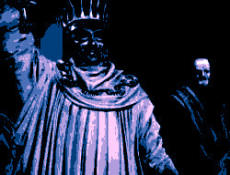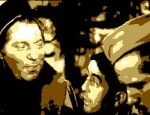Film Review
Sophocles'
Oedipus Rex
(a.k.a.
Oedipus the King) is
not only a pinnacle of Ancient Greek theatre, it is also one of the
keystones of world literature. The play may have been written
almost two and half millennia ago but it still has an electrifying
resonance, as it toys with a question that has vexed the human mind
since the dawn of time: do human beings have free will, or are our
destines already marked out for us, immutable etchings on the tapestry
of time? The impact that
Oedipus
Rex has had on western literature cannot be understated, and it
even lent its name to Freud's most famous complex. Bizarre, then,
that such a well-known and influential play should have to wait until
1957 before it was first made into a full-length film.
The most striking (and maddest) thing about Tyrone Guthrie's film
adaptation of Sophocles' play is that instead of distancing itself from
its Ancient Greek origins it embraces these to the fullest extent, and
in doing so ends up as a work of astonishing dramatic power.
Guthrie, one of Britain's most esteemed stage actors, had recently
directed a production of
Oedipus Rex
for the Canadian Stratford Festival, using William Butler Yeats'
translation, and this highly stylised, minimalist production provided
the basis for his film adaptation. Guthrie had directed three
films for television before this but this was his first film for the
cinema. He was assisted by a more experienced director, Abraham
Polonsky, who was on a Hollywood blacklist at the time (after his
refusal to testify before the HUAC during the McCarthy anti-Communist
purge) and is best known his for coldly realist film noir
The
Force of Evil (1948). Polonsky's technical know-how
and Guthrie's expertise as a stage director resulted in a film that is
both brilliant and uniquely fascinating.
In keeping with the best-known tradition of Ancient Greek theatre, the
entire cast are obliged to wear masks, most of which are something you
would expect to encounter in a nightmare. Modelled on bare
skulls, partially decomposed birds or something that would be more at
home in a seriously low budget sci-fi movie, the masks are so
alarmingly unreal that the protagonists are scarcely recognisable as
human beings. Rather, they resemble monstrous automata enacting
some kind of unspeakable ritual that is somewhere between a Black Mass
and an episode of
The Muppet Show filmed in the deepest pit in Hell
(Birmingham, probably). The entire play takes place within a
ludicrously small space, a raised platform that looks like an altar for
a blood sacrifice, surrounded by a featureless blue-grey
cyclorama. On paper, this must sound cheap and tacky, but on the
screen it is startlingly (and inexplicably) effective.
Guthrie's decision to make the characters resemble puppets was
presumably intended to mock rather than endorse Oedipus's belief that
he is a victim of divine powers. From the outset, we see that the
Theban king is the architect of his own doom, and that what appears to
be the workings of Fate is actually the consequence of his own
ill-judged actions. (Tell a man his future and naturally, by
doing everything he can to avoid this outcome, he will only end up
making the prophesy a reality.) The protagonists start out as
freakishly sinister marionettes but acquire an unmistakable humanity as
the plot unfolds, and in the end we scarcely notice the masks, or at
least we see through them to the soul that lies behind.
Needless to say, the performances are as strident and stylised as the
over-elaborate masks, and this adds to the sense that what we are
watching is a demonic ritual rather than a piece of theatre. As
Oedipus, Douglas Campbell has an astonishing presence, filling the
screen with his power and majesty as a tyrannical monarch whilst
saturating our hearts with the pathos of his predicament. As he
rants and rages behind his beautifully sculptured mask, he looks like
he is about to punch his way through the screen, and when his
unintended crimes are revealed to him he becomes a figure of abject
pity, a mighty behemoth reduced to broken down wreck of a man.
Who says an actor's face needs to be visible for him to give a great
performance?
The cast (mostly habitués of the Canadian Stratford Festival)
includes two actors who were virtual unknowns at the time but went on
to become two of sci-fi's most enduring icons. Playing the Messanger is
Douglas Rain, who would later find lasting fame as the voice of HAL
9000 in Kubrick's
2001: A Space Odyssey
(1968). In the Chorus is a 26-year-old William Shatner, almost a
full decade before he first took command of the USS Enterprise in
Star Trek. Now we know why
Shatner acts as he does.
An oddity of a film from just about every angle, Tyrone Guthrie's
Oedipus Rex manages to be both
faithful to the original play (looking almost as it would have done
when first staged in the 5th century BC) and astonishingly easy to
engage with. It takes none of the self-serving liberties that
Philip Saville's glitzier, star-studded 1968 version does, and is all
the better for that. By staying true to Sophocles' timeless play,
and unconsciously venturing into Jim Henson territory as he does so,
Guthrie serves up a meditation on free will and predestination that is
as engrossing as it is cutely weird.
© James Travers 2014
The above content is owned by frenchfilms.org and must not be copied.
Film Synopsis
As a deadly plague threatens the ancient city of Thebes, its esteemed
ruler, King Oedipus sends his brother-in-law Creon to consult the
Oracle at Delphi. Creon reports that the plague is directly
attributable to the murder of the previous king, Laius, and will go
only after the murderer has been found and punished. To save his
people, Oedipus makes a solemn vow to find the miscreant, little
knowing that he is himself Laius's assassin. It all began, many
years ago, when King Laius was warned by the Oracle that he would be
killed by his own son. To avoid this fate, he ordered that his
infant son be bound and slain. The boy was saved by a shepherd
and grew up in ignorance of his real identity. As a young man, he
would indeed kill Laius and, through a bizarre set of circumstances,
end up marrying his own mother, Jocasta. That man was
Oedipus...
© James Travers
The above content is owned by frenchfilms.org and must not be copied.



